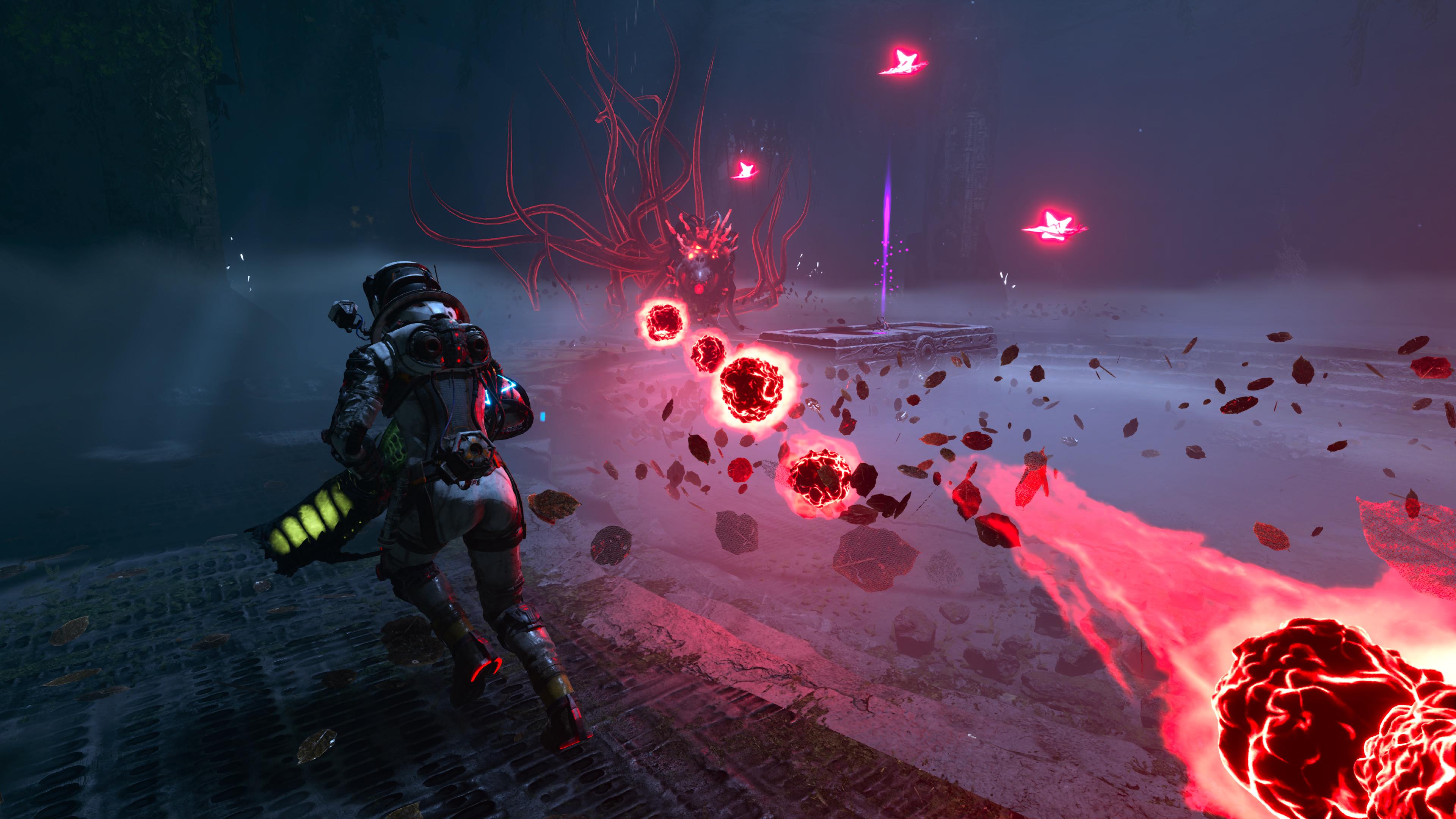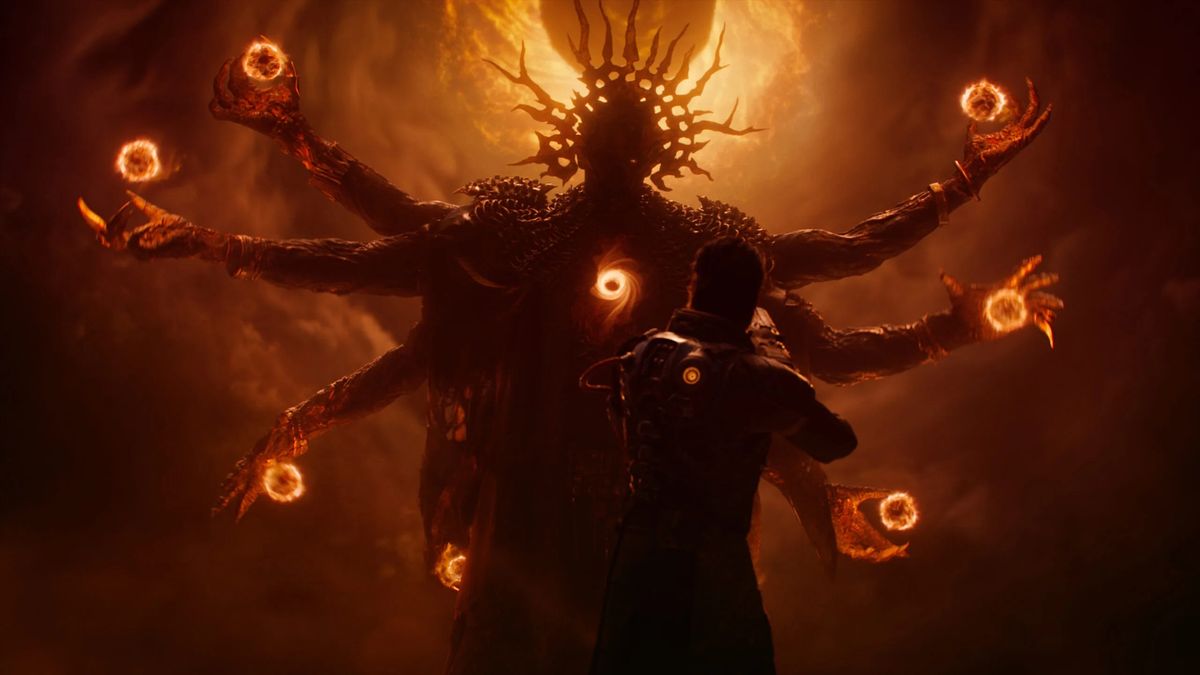Horror-tinged chills and thrills dominated yesterday’s Sony State of Play, but Saros is perhaps the most interesting of all. A stunning yet simple reveal trailer accompanied developer Housemarque’s announcement, revealing Saros not as a sequel to its “beguilingly weird blockbuster” Returnal, but a spiritual successor.
That fact alone has sent minds racing. After all, Saros seems to hinge on Returnal’s key stylistic beats. It’s a third person action-roguelike hybrid, for a start, set on a hostile planet called Carcosa that is filled with untold horrors – so if it’s not a sequel, why is it sequel-shaped? There’s one key caveat that sets the two apart already. Unlike Returnal, Saros take on more roguelite traits to see you “come back stronger” – three words repeated throughout the trailer that already have me seated patiently on that hype train, awaiting a very different kind of roguelike experience in 2026.
Grind and punishment

It’s hard to talk about the best roguelikes without mentioning a certain Supergiant series, so I’ll get right to the point. If Returnal’s biggest Hades-adjacent comparison is the existence of carried over currencies and drip-fed narrative upon each untimely death, Saros’ could be something like God Mode.
I can already hear enervated eyeballs rolling back into the skulls of every God Mode hater out there, but hear me out. God Mode is the only real way players can “come back stronger” in a game like Hades. It’s seen as an accessibility setting, togglable at will, and although God Mode does not weaken enemies, each death awards the player a small amount of armor toward their next run. This effect can be stacked until you reach 80% resilience against incoming damage, though you’d have to rack up a lot of 2% buffs – 40 deaths in total – to reach the cap. I consider it a great onboarding tool to help new roguelike players (like I was, back in 2020) get acquainted with the genre. It’s also just another way to tailor the experience in line with personal preference. That said, many might erroneously equate God Mode with cheating. Call it stigma or pride, but its existence as an accessibility setting might make players nervous to admit they use it – or that in using it, their experience is somehow less-than.
This sense of “harder game = better game” can be damaging. Roguelikes are meant to be challenging, but not everyone wants to feel punished. That’s what the best FromSoftware games are for. Returnal is one of the more punishing roguelikes out there, taking genre staples like randomized enemies, unpredictably chained biomes, and the cyclical structure of try, die, try again to new extremes.
It’s a visual onslaught of color, action, and particle physics abound, all of which give it the “Housemarque bullet-hell flair” the developer is known for. In doing so, however, Returnal’s precarious weighting between risk and reward somewhat ignores skill diversity.
Stronger than yesterday

You have a game that can feel more interested in punishment over enjoyment…
Losing all your Adrenaline after taking a single hit in Returnal is agonizing, despite encouraging smarter use of dodge tactics. Failing to keep my streak up would bitterly remind me of Thanatos’ keepsake in Hades, which bestows incremental damage boosts upon completing encounters unscathed. Unlike Returnal, though, you don’t lose your stack upon taking damage in Hades.
Maybe I just need to get good, but mechanics like these run the risk of discouraging players who are trying to get better. Pair it with accessibility settings that are well-intentioned, though sometimes flawed – the chaotic UI is something mentioned frequently on Reddit, even with UI cleanup enabled – and you have a game that can feel more interested in punishment over enjoyment unless you have the skill, time, and patience.
Saros could well change that. “A key gameplay distinction between Saros and Returnal is permanent resources and progression making every death valuable,” Housemarque writes in a PlayStation Blog post. “After every death you will face a changed world, but in Saros you will be able to choose and permanently upgrade your loadout from an evolving set of weapons and suit upgrades to ‘come back stronger’ to overcome the challenges you face on Carcosa.”
To me, the operative word here is “choose.” Already, Saros sounds more flexible in its adaptation of roguelike mechanics, potentially broadening the scope for players who might prefer an incremental power fantasy over all-out challenge. Plus, if it’s built into the game rather than an accessibility toggle, maybe people will feel less guilty about using those tools than they are about God Mode. We don’t know much else about its combat, world, or story – other than being “an emotional and powerful character study that explores the cost it takes to create a new future” – but all signs are already pointing in an intriguing new direction in Saros.
Just like Deadpool, I’m making an educated wish: here’s hoping Saros will see Housemarque continue to take meaningful steps in the name of roguelike approachability. By potentially focusing on player strengthening with each new “death” of the sun, heralding in the start of a new loop, Saros sounds like it wants to empower its players rather than heap on the challenges – and I can’t wait to come back stronger every time.
Check out all the upcoming PS5 games joining Saros on the PlayStation console











Leave a Reply